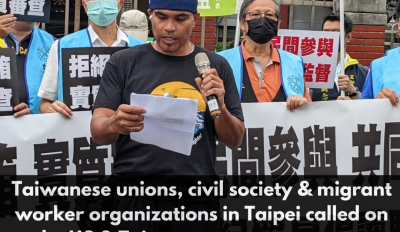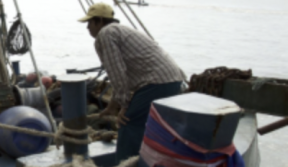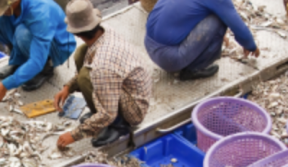
The Wi-Fi Now For Fishers’ Rights Campaign issued the following statement on the U.S.-Taiwan Initiative on 21st Century Trade:
On Tuesday, May 23rd, dozens of Taiwanese unions, civil society organizations and migrant worker organizations in Taipei issued their demands for the U.S.-Taiwan Initiative on 21st Century Trade to the Taiwanese and U.S. governments, calling on the governments to protect labor and the environment as they negotiate the trade initiative this year.
The Wi-Fi Now For Fishers’ Rights Campaign, represented by the Taiwan Association for Human Rights (TAHR), Serve the People Association (SPA), and the Indonesian Seafarers Gathering Forum (FOSPI), participated in the action to ensure fishers’ rights in Taiwan are protected in the labor chapter of the trade initiative. Our coalition members called for the trade initiative to include special protections for migrant fishers in Taiwan’s distant-water fishing fleet, specifically: guaranteed and secure Wi-Fi communication while at sea to ensure their ILO fundamental labor rights, including the right to form and join unions.
Migrant workers are a major contributor to the Taiwanese economy, with more than 750,000 working in many key industries under unjust and abusive working conditions. More than 22,000 Southeast Asian migrants work in Taiwan’s fishing industry, which comprises over a thousand vessels that fish in all of the world’s oceans. Fishers at sea face forced labor and other abusive conditions that have driven them to organize unions – but without regular Wi-Fi access to connect them back to shore, the ocean is effectively a “no union zone” for too many of these workers. This violates international standards on fundamental labor rights that Taiwan and the United States have committed to upholding as part of the trade initiative. Our campaign has called on the U.S. and Taiwan to ensure fishers can exercise their international labor rights, including freedom of association, by ensuring access to Wi-Fi communication at sea.
Seafood production in Taiwan is a pivotal industry for labor and should be addressed in the trade initiative. Taiwan has the world’s second-biggest distant-water fleet and the U.S. is the second largest importer of seafood worldwide. Much of the tuna and other fish that fishers catch on Taiwanese vessels is sold in the U.S. and Taiwan's fish has been listed on the U.S. Department of Labor List of Goods Produced by Child Labor or Forced Labor for the past two years.
The Wi-Fi Campaign met with trade negotiators in the U.S. and Taiwan earlier this year and proposed concrete language for the labor chapter that would ensure fishers’ rights are protected in the trade initiative. During this week’s action, the delegation brought their demands to the Executive Yuan, Legislative Yuan and the American Institute of Taiwan (AIT).
We launched our international campaign to support migrant fishers in their fight for Wi-Fi because the fishers’ have named it as a key component in their fight for their fundamental labor rights at sea. They face extremely severe abuses in Taiwan’s fishing industry, which have been documented by the U.S. government and other actors. Last year, the Biden Administration issued a high-level memorandum identifying forced labor as a major issue in distant water fishing, especially “Illegal, Unreported and Unregulated” or “IUU” fishing.
We urge the Executive Yuan and the Biden administration to ensure that the U.S.-Taiwan Initiative on 21st Century Trade contains commitments to fundamental labor rights for all workers, including freedom of association, health and safety protections, and elimination of forced labor and discrimination against migrant workers. We will continue our advocacy as negotiations continue.
###
The Wi-Fi Now For Fishers’ Rights Campaign is made up of U.S., Taiwanese and Indonesian allies, including the Indonesian Seafarers Gathering Forum, or Forum Silaturahmi Pelaut Indonesia (FOSPI), Global Labor Justice - International Labor Rights Forum (GLJ-ILRF), Taiwan Association for Human Rights (TAHR), Stella Maris Kaohsiung, Serve the People Association (SPA), and Humanity Research Consultancy (HRC).
Click here for more info about the Wi-Fi Now for Fishers’ Rights at Sea campaign.


